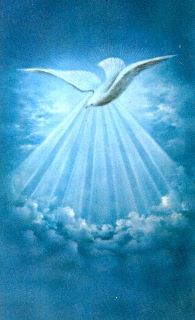
PRACTICAL GUIDANCE
The assembly should seek
His guidance in all its affairs’ whether in choosing a location for its
public testimony, arranging the types of meetings to be held, discerning
the human instruments to be used in ministering the Word of God,
disbursement of funds, or carrying on godly discipline.
THE HOLY SPIRIT IS SOVEREIGN
The local church should
ever recognize the sovereignty of the Spirit. By this we mean that He
can do as He pleases, and that He will not always choose to do things in
exactly the same way, though He will never act contrary to the Word.
Some of the symbols of the Spirit used in the scriptures – fire, oil,
water, wind speak of fluidity, of unpredictable behavior. Thus, wise
Christians will be sufficiently elastic to allow Him this divine
prerogative.
It was so in the early
church, but soon people became uneasy with meetings that were “free and
social, with the minimum of form.” Thus controls were added and
formalism and ritualism took over. The Holy Spirit was quenched, and the
church lost its power.
QUENCHING THE SPIRIT
This shift from the freedom
of the Spirit to human control has been described by James Denney
eloquently. Though Mr. Denney writes at some length, the reader will
find his article will richly repay study Commenting on the verse, “Quench not the Spirit,” (I Thess 5:19)
he says: ‘When the Holy Spirit descended on the Church at Pentecost,
there appeared unto them tongues parting asunder, like as of fire; and
it sat upon each one of them’; and their lips were opened to declare the
mighty works of God. A man who has received this great gift is
described as fervent, literally, boiling, with the Spirit. The new birth
in those early days was a new birth; it kindled in the soul thoughts
and feelings to which it had hitherto been strange; it brought with it
the consciousness of new powers; a new vision of God; a new love of
holiness; a new insight into the Holy Scriptures, and into the meaning
of man’s life; often a new power of ardent, passionate speech. In the
First Epistle to the Corinthians Paul describes a primitive Christian
congregation. There was not one silent among them. When they came
together every one had a psalm, a revelation, a prophecy, an
interpretation. The manifestation of the Spirit had been given to each
one to profit withal; and on all hands the spiritual fire was ready to
flame forth. Conversion to the Christian faith, the acceptance of the
apostolic Gospel, was not a thing which made little difference to men:
it convulsed their whole nature to its depth; they were never the same
again; they were new creatures, with a new life in them, all fervor and
flame
“A state so unlike nature,
in the ordinary sense of the term, was sure to have its inconveniences.
The Christian, even when he had received the gift of the Holy Ghost, was
still a man; and as likely as not a man who had to struggle against
vanity, folly, ambition, and selfishness of all kinds. His enthusiasm
might even seem, in the first instance, to aggravate, instead of
removing, his natural faults. It might drive him to speak-for in a
primitive church anybody who pleased might speak – when it would have
been better for him to be silent. It might lead him to break out in
prayer or praise or exhortation, in a style which made the wise sigh.
And for those reasons the wise, and such as thought themselves wise,
would be apt to discourage the exercise of spiritual gifts altogether.
‘Contain yourself,, they would say to the man whose heart burned within
him, and who was restless till the flame could leap out; ‘contain
yourself; exercise a little self-control; it is unworthy of a rational
being to be carried away in this fashion.’
“No doubt situations like
this were common in the church at Thessalonica. They are produced
inevitably by difference of age and of temperament. The old and the
phlegmatic are a natural, and, doubtless, a providential, counterweight
to the young and sanguine. But the wisdom which comes of experience and
of temperament has its disadvantages as compared with fervor of spirit.
It is cold and unenthusiastic; it cannot propagate itself; it cannot set
fire to anything and spread. And because it is under this incapacity of
kindling the souls of men into enthusiasm, it is forbidden to pour cold
water on enthusiasm when it breaks forth in words of fire. That is the
meaning of ‘Quench not the Spirit.’ The commandment presupposes that the
Spirit can be quenched. Cold looks, contemptuous words, silence,
studied disregard, go a long way to quench it. So does unsympathetic
criticism.
“Everyone knows that a fire
smokes most when it is newly kindled; but the way to get rid of the
smoke is not to pour cold water on the fire, but to let it burn itself
clear. If you are wise enough you may facilitate this by rearranging the
materials, or securing a better draught; but the wisest thing most
people can do when the fire has got hold is to let it alone; and that is
also the wise course for most when they meet with a disciple whose zeal
burns like fire. Very likely the smoke hurts their eyes; but the smoke
will soon pass by; and it may well be tolerated in the meantime for the
sake of heat.
For this apostolic precept
takes for granted that fervor of spirit, a Christian enthusiasm for what
is good, is the best thing in the world. It may be untaught and
inexperienced; it may have all its mistakes to make; it may be
wonderfully blind to the limitations which the stern necessities of life
put upon the generous hopes of man: but it is of God; it is expansive;
it is contagious; it is worth more as a spiritual force than all the
wisdom in the world.
“I have hinted at ways in
which the Spirit is quenched, it is sad to reflect that from one point
of view the history of the church is a long series of rebellions of the
Spirit. ‘Where the Spirit of the Lord is,’ the Apostle tells us
elsewhere, ‘there is liberty.’ But liberty in a society has its dangers;
It is, to a certain extent, at war with order; and the guardians of
order are not apt to be too considerate of it. Hence it came to pass
that at a very early period, and in the interests of good order, the
freedom of the Spirit was summarily suppressed in the church. ‘The gift
of ruling,’ it has been said, ‘like Aaron’s rod, seemed to swallow up
the other gifts.’ The rulers of the church became a class entirely apart
from its ordinary members, and all exercise of spiritual gifts for the
building up of the church was confined to them. Nay, the monstrous idea
was originated, and taught as a dogma, that they alone were the
depositaries, or, as it is sometimes said, the custodians, of the grace
and truth of the gospel; only through them could men come into contact
with the Holy Ghost. In plain English, the Spirit was quenched when
Christians met for worship. One great extinguisher was placed over the
flame that burned in the hearts of the brethren; it was not allowed to
show itself; it must not disturb, by its eruption in praise or prayer or
fiery exhortation, the decency and order of divine service.
I say that was the
condition to which Christian worship was reduced at a very early period;
and it is unhappily the condition in which, for the most part, it
subsists at this moment. Do you think we are gainers by it? I do not
believe it. It has always come from time to time to be intolerable. The
Montanists of the second century, the heretical sects of the middle
ages, the Independents and Quakers of the English Commonwealth, the lay
preachers of Wesleyanism, the Salvationists, the Plymouthists, and the
Evangelistic associations of our own day, all these are in various
degrees the protest of the Spirit, and its right and necessary protest,
against the authority which would quench it, and by quenching it
impoverish the church.”
The assembly, then, should
never fetter the Holy Spirit, either with unscriptural rules,
stereotyped program, rituals, or liturgies. How grieved He must often be
by rigid understandings that a meeting must end at a certain time, that
a service must always follow a certain routine, that ministry at
certain stages of a worship meeting IS quite unacceptable! Such
regulations can only lead to a loss of spiritual power.
IF THE SPIRIT HAD HIS WAY TODAY
We might well pause to ask
ourselves what it would be like in our local churches if the Holy Spirit
were really depended on to be the Divine Leader. C. H. Mackintosh gives
a vivid description of such a situation, and we reproduce it here:
“We have but little
conception of what an assembly would be were each one distinctly led by
the Holy Ghost, and gathered only to Jesus. We should not then have to
complain of dull, heavy, unprofitable, trying meetings. We should have
no fear of an unhallowed intrusion of mere nature and its restless
doings—no making of prayer—no talking for talking’s sake—no hymnbook
seized to fill a gap. Each one would know his place in the Lord’s
immediate presence—each gifted vessel would be filled, fitted, and used
by the Master’s hand—each eye would be directed to Jesus—each heart
occupied with Him. If a chapter were read it would be the very voice of
God. If a word were spoken, it would tell with power upon the heart. if
prayer were offered, it would lead the soul into the very presence of
God. If a hymn were sung, it would lift the spirit up to God, and be
like sweeping the strings of the heavenly harp. We should feel ourselves
in the very sanctuary of God and enjoy a foretaste of that time when we
shall worship in the courts above and go no more out.”
|
Related articles
- Great Truths About the Church-william Macdonald (ioan17.wordpress.com)












_ Isaia 7/14; _ Matei 1/18,21-23 _ *Fecioara este insarcinata* -[acum in 2012].
ReplyDelete-1) =“Vorbesc in pilde” _ Matei 13/34,35, ...asa cum este [si] vorbirea prorocilor in Scripturi, ...care inca sint “pecetluite” _ Daniel 12/4,[9], ...pana la Mine _ Romania 5/14, ...Acela fagaduit _ Deuteronom 18/15,18; _ Faptele Apostolilor 3/22;
-2) = Pentru a intelege, mai mult si mai bine, trebuie sa cititi Cartea _ Daniel 12/4, ...si mai mult de atat, ...cei carora le este dat sa primeasca _ Matei 19/11, ...sa [si] cerceteze _ Ioan 5/39, ...fara sa uitati _ 2 Petru 1/20;
-3) = Potrivit _ Matei 6/10: ...”Vie Imparatia Ta; Faca-se voia Ta, precum in Cer asa si pe Pamant”, ...privitor si la semnele vremurilor / venirea Fiului Omului _ Luca 21/7, ..:
_*Pe alocuri vor fi mari cutremure de pamant, foamete si ciume; vor fi aratari inspaimantatoare si semne mari in cer.* _ Luca 21/11;
_*Vor fi semne in soare, in luna si in stele. Si pe pamant va fi stramtorare printre neamuri, care nu vor sti ce sa faca la auzul urletului marii si al valurilor.* _ Luca 21/25.
-{Evaluati, dupa ce insumati si coroborati [cu] toate catastrofele planetare: ...razboaiele provocate si intretinute de cei care se cred "jandarmii planetari", miscarile seismice / cutremurele, inundatiile, incendiile, avalansele, alunecarile de terenuri, ...etc, ...etc, ...incepand cu "tsunami"-ul din martie 2011 din Japonia, care, ...[ca posibil fenomen deosebit], ...a fost previzionat de marele prevazator Simon(a) / *Urania* -vezi “google.ro”}, ...
…care trebuiesc deasemenea coroborate si cu _ Matei 1/18,21-23, ...unde este scris clar: ...-*Iata, Fecioara va fi insarcinata, va naste un fiu, ......* ...ceea ce inseamna [ca] in mod implicit ...despre semnele vremurilor, vorbesc [si] ...Stelele, Astrele, Planetele, cu referire la Constelatia Fecioara in care a intrat Marte [la sfarsitul anului 2011], ...asa cum a previzionat Simon(a) / *Urania*; ...-Toate acestea fiind in concordanta cu: ...-“”Vie Imparatia Ta; Faca-se voia Ta, *precum in Cer, asa si pe Pamant*”” _ Matei 6/10; _ Facerea 1/14-18, ...- “acum” / a treia zi _ 2 Petru 3/8 –mileniul 3, cand am fost inviat dintre cei morti _ Romania 5/14, ..si trimis _ Exodul 3/14; 4/1,[10],11,2012, ...pentru implinirea Legii _ Romania 10/4 si prorocilor _ Matei 5/17, ...doar ati citit _ Ioan 4/25, ...adica Scripturile vorbesc despre viitor [-nu despre trecut]: ...*Stiu ca are sa vina Mesia; Cand va veni El, are sa ne spuna toate lucrurile*/ [Ceea ce incerc sa fac, pentru cei care au urechi de auzit, si aud _ Luca 8/8, ...-Dar, credeti? _ Luca 18/8]; _ Deuteronom 18/15,18; _ Faptele Apostolilor 3/22; _ Luca 16/29,31.
= Cu stima. –Mesia _ Romania 5/14; 10/[14 -Moise],17,[18]; _ Ioan 4/[25]; _*Eu, cel care vorbesc cu tine, sint Acela* _ Ioan 4/26; [_ Luca 16/29,31; 18/8].
_ Apocalipsa 3/19; _ Ioan 3/[16],19; _ Luca 18/8; 8/8: ...
ReplyDelete= Din pricina *neintelegerii Scripturilor / Cartii pecetluite* _ Dan.12/4,[9], ...de catre intreaga omenire, implicit de catre cei care *stau pe scaunul Meu* _ Mat.23/1,2, care ”s-au facut ei intre ei” - *invatatori si dascali* in felurite Religii si BISERICI, ...[unii in vesminte cu filacterile late si poale lungi], printre care si cei ce-si zic: -"Indrumatori" _ Is.9/16,- Conducatori, Judecatori, Procurori, "Legiuitori", [etc] _ Mat.23/[4,5,6],7,[8-10], care, neintelegand *Cartea* _ Dan.8/26; 12/4, implicit Cartea *APOCALIPSA lui IOAN*, fiindca: -*au urechi de auzit dar nu aud, si au ochi de vazut dar nu vad* _ Isaia 6/[8],9, ...au transmis ideea falsa privitor la intelegerea cuvantului APOCALIPSA ca definind Sfarsitul Vietii / Disparitia PLANETEI.
= Au citit si citesc de mii de ani”, dar nu au priceput _ Isaia 6/9, fiind preocupati de *fatarnicie, trai in lux si destrabalare* in contradictie cu prorociile si in contrast cu *traiul norodului*, pentru care impun si cersesc, [de la vaduve si orfani], *danii, daruiri, taxe, zecime, zeciuiala, impozite*, respectiv din partea acelora pe care-i tin in intuneric, *lesne crezatori* _ Romania 16/18; _ Mat.23/13-14, pentru ca nu au priceput ce inseamna *Apocalipsa lui Ioan*.
= APOCALIPSA inseamna ...*DESCOPERIRE / Revelare*, cum e scris -*DESCOPERIREA lui Isus Hristos*, intelegerea cuvantului APOCALIPSA fiind cuprinsa chiar in “definitia din versetul _ Apoc.1/1”, insemnand: DESCOPERIREA / revelarea Adevarului _ Ioan 1/1,5, *aducerea la lumina [zilei a 7-a], fata de intunericul [noptii / dinaintea zilei a 7-a]* _ Isaia 21/11,2012, ...[-vezi _ 2 Petru 1/20] notiunea *SFARSIT* insemnand Sfarsitul Legii, a se intelege “Implinirea / Savarsirea Legii _ Romania 10/4, -adica descoperirea lui Isus Hristos, prin IMPLINIREA Legii in Hristos, *AUZIREA venind prin Cuvantul lui Hristos* _ Romania 10/17, dar omenirea nu Ma credeti _ [Mat.13/57; _ Mar.6/4; _ Ioan 4/44], ...(si) ...pentru ca nu Ma cunoasteti si nu stiti cum sint chemat _ Romania 10/14, ...si, ...pentru ca *nu exista intelegerea Scripturilor, neascultarea de proroci si de Mine _ Luca16/31; _ Faptele Ap.3/22, asa cum este scris,... implicit “neintelegerea prorociilor” despre venirea prin *Schimbare la Fata* _ Mat.17/2,3,[5].
= Schimbarea la Fata _ Mat.17/1, asa cum este scris se va fi produs *dupa 6 zile*,[coroborat _ Is. 21/11,2012], ...adica, ...trebuie inteles, ca *omenirea este in ziua a 6-a / in noaptea spre dimineata / zorii zilei a 7-a, cand Dumnezeu va fi Sfarsit Lucrarea Facerii omului, ..."nu sfarsitul lumii", ...adica, ...urmand ziua de odihna, cum este scris: ...-*Dumnezeu Si-a vazut* Savarsita / implinita / SFARSITA Lucrarea FACERII Omului* -*DUPA CHIPUL Sau* _ Gen.1/27, coroborat(i) cu _ Romania 5/14, acum, fiind abia inceputul _ Ex.3/[13],14, ...coroborat cu _ Is.6/[8],9,10; _ Ex.4/1,[10],11,2012, intrupat _ Ioan 1/1,5,11,14, ...pentru “implinirea* _ Gen.2/1-3, ... asa cum *Dumnezeu A ZIS* _ Gen.1/[26,27],28, toate acestea fiind in concordanta cu prorociile, implicit SFARSITUL Erei ASTRALE -*SOARELE in PESTI*, ...Eu fiind nascut / ridicat / venit din PESTI, ...despre care ‘s-a zis’ ca ...s-ar fi descoperit *o placuta*, continand gravata o stea venind din PESTI / Constelatia PESTI, ...despre care este scris _ Is.9/2; _ Mat.4/16.
- Sper sa nu fie nimeni suparat pentru mustrarile implicite din mesajele Mele _ Apocalipsa 3/19.
= Cu stima. -Mesia _ Deut.18/15,18; _ Faptele Ap. 3/22; _ Is.6/[8],9-[13]; 9/1,2,6; 52/6 _ Moise -*Iata-Ma!; _ Romania 5/14; 10/[14],17,[18]; _ Ioan 4/[25],26; {5/39}; _ Ex.3/14; 4/1,[10],11,2012; _ *Toate popoarele chemate* _ Is.55/1,6-9,[10],11,2012; _ Vine dimineata _ Is.21/11,2012; -*Iata-Ma! Iata-Ma!* _ Isaia 65/1; _ Romania 10/20; _ Ioan 4/[25],26.